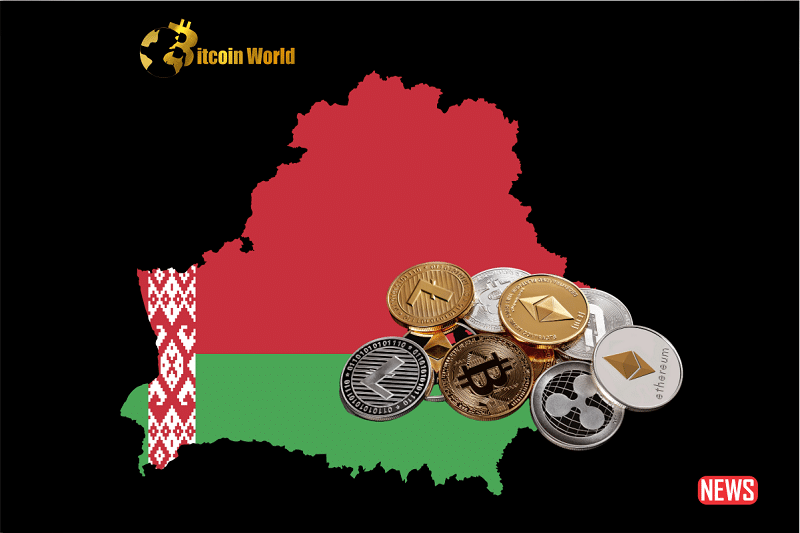Heads up, crypto enthusiasts! Things are shifting in Eastern Europe, and if you’ve been keeping an eye on Belarus’s crypto scene, you’ll want to pay close attention. In a move that’s got the crypto world buzzing, Belarus is putting the brakes on peer-to-peer (P2P) cryptocurrency transactions involving popular names like Bitcoin. Why the sudden change? Let’s dive into how this decision aims to tackle the growing problem of cybercrime in the country.
Why the Ban on P2P Crypto Transactions?
Think of it like this: while the decentralized nature of crypto has its perks, it can also be a playground for those with less than honest intentions. Belarus has seen a surge in cybercrime, and unfortunately, P2P crypto exchanges have become a popular avenue for illicit activities. The Ministry of Foreign Affairs (MFA) of Belarus pulled back the curtain on this situation with a revealing statement on July 2nd.
The numbers speak for themselves. Local prosecutors have already taken action against 27 individuals involved in running illegal crypto exchange services. And the scale of the problem? A whopping $8.7 million in illicit gains was seized! This crackdown highlighted how easily fraudsters were exploiting P2P platforms to:
- Cash out stolen funds without leaving a clear trail.
- Convert illegal earnings into cryptocurrency.
- Facilitate money transfers within criminal networks, making it harder for authorities to track.
What’s the Government’s Plan of Action?
So, how does Belarus plan to rein in this crypto-fueled cybercrime? The government is introducing some significant legislative changes. The core of the new strategy involves prohibiting direct cryptocurrency exchanges between individuals. Instead, if you’re a Belarusian citizen looking to buy, sell, or trade crypto, you’ll need to go through authorized exchanges operating under the High-Tech Park (HTP). Think of it as a more regulated and transparent system.
Here’s a breakdown of the key changes:
- Ban on Individual Exchanges: Direct P2P crypto transactions are off the table.
- Authorized Exchanges Only: All crypto financial transactions must go through licensed platforms within the HTP.
- Registration Requirement: Crypto exchanges will need to be officially registered and licensed to operate.
A Shift from a Crypto-Friendly Stance?
This move might surprise some, especially considering Belarus’s previously welcoming attitude towards the crypto world. Remember just last year when President Alexander Lukashenko signed a decree establishing a crypto wallet registry to combat illicit activities? And let’s not forget the tax exemptions for crypto-related businesses, recently extended until January 2025. This new ban signals a strategic pivot, prioritizing security over the completely open, decentralized model.
What are the Potential Benefits?
While some might see this as a step back for crypto freedom, there are potential upsides. What benefits could this new regulation bring?
- Reduced Cybercrime: By closing off a key avenue for illicit activities, the government aims to significantly curb crypto-related cybercrime.
- Increased Transparency: Channeling transactions through authorized exchanges provides greater visibility and makes it easier to track suspicious activity.
- Enhanced Security: Licensed platforms are likely to have stronger security measures in place, protecting users from fraud and scams.
- Greater Control: The government gains more control over the cryptocurrency ecosystem, allowing for better monitoring and regulation.
What Challenges Might Arise?
Of course, any significant policy shift comes with its own set of challenges. What hurdles might the Belarusian crypto community face?
- Limited Decentralization: The ban goes against the core principle of decentralization that many crypto enthusiasts value.
- Potential for Reduced Privacy: Using regulated exchanges inherently involves sharing more personal information.
- Adaptation for Users: Individuals accustomed to the flexibility of P2P transactions will need to adapt to the new regulations.
- Impact on Small Traders: The fees and regulations associated with licensed exchanges might disproportionately affect smaller crypto traders.
Actionable Insights for Crypto Users in Belarus
If you’re a crypto user in Belarus, what should you do now? Here are a few key takeaways:
- Familiarize Yourself with Authorized Exchanges: Start researching and understanding the licensed platforms operating under the HTP.
- Prepare for Registration: Be ready to comply with any registration requirements for using these exchanges.
- Prioritize Security: Always prioritize security best practices when using any crypto platform, including strong passwords and two-factor authentication.
- Stay Informed: Keep up-to-date with the latest regulations and announcements from the Belarusian government.
What’s the Big Picture?
Ultimately, Belarus is sending a clear message: they’re serious about tackling cybercrime and are willing to make bold moves to achieve that goal. While this ban on P2P transactions might be seen as a trade-off between decentralization and security, it underscores the government’s commitment to maintaining the integrity of its financial system and protecting its citizens. This proactive approach could serve as an example for other nations grappling with similar challenges in the evolving landscape of cryptocurrency.
In Conclusion: A New Era for Crypto in Belarus
The decision to ban P2P crypto transactions in Belarus marks a significant turning point in the country’s approach to digital currencies. While it may present adjustments for crypto users, this move is firmly rooted in the government’s determination to combat cybercrime and foster a more secure financial environment. By prioritizing transparency and control through authorized exchanges, Belarus is not just tightening its grip on illicit activities but also setting a precedent for responsible cryptocurrency regulation. The world will be watching to see the long-term impact of this bold stance.
Disclaimer: The information provided is not trading advice, Bitcoinworld.co.in holds no liability for any investments made based on the information provided on this page. We strongly recommend independent research and/or consultation with a qualified professional before making any investment decisions.




